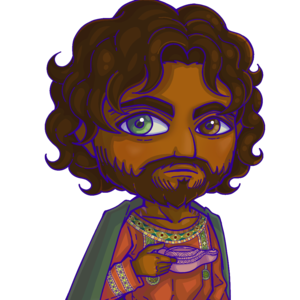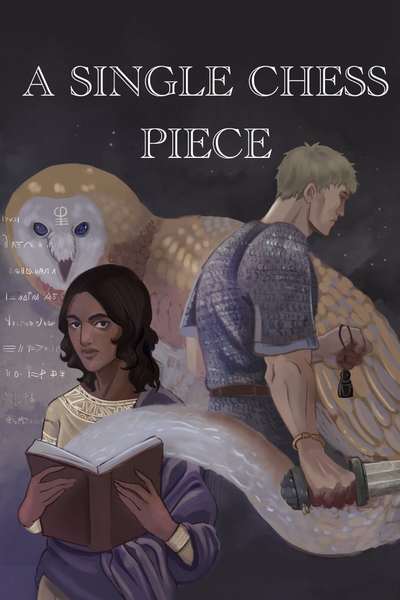It was a warm April day. A small girl, maybe 10 years old, was sitting on the floor of her father’s study, sucking on a strand of her long black hair thoughtfully. She was looking intently, and rather critically, at a large drawing of a spiral, composed of triangles, which she was in the process of drawing on the polished marble floor. The ink seeped into the cracks between the marble panels. The girl’s hands, face and dress were all smudged and blotched with ink too. It was not this mess that made her sigh heavily however, but the fact that the spiral seemed…imperfect. The girl was about to rub out the last two triangles with her other, still clean, sleeve when a stern voice interrupted her thoughts.
“Are you five years old to go around drawing on walls?”
The girl stared up into the face of a bored-looking man in his mid-thirties. Quickly she averted her gaze from his eyes instead looked at her own, ink-stained fingers. She felt a knot in her throat. She swallowed. “It’s not on the wall, it’s on the floor…” she said softly.
The young man sighed, “I don’t see how that makes a difference!”
“It doesn’t. But you did say ‘walls’ so…” she knew she should stop speaking. Her father explained repeatedly that people usually mean what they say only in a loose sense; getting fixated on the meaning of a single word led to nowhere. And it irritated people. The girl pit off the last words and glanced at the man, who was now sighing tragically. He threw a haughty look at her filthy clothes and sternly asked her to sit at the desk. When she obliged, he pulled out a thick scroll from the leather bag which he was carrying. The girl threw one look at the title and shuddered: “Prometheus Bound”. She was deeply convinced that the only thing worse than tragedies, were comedies. She gave one longing look at her spiral and surrendered herself to the dramatic speeches of Aeschylus’ heroes.
*
Rhode Dokeiana looked helplessly around the spacious, comfortable room she shared with her three cousins. She was a thin, frail-looking woman, in her late twenties. She had a delicate, olive-brown face with a pointed chin and a long nose, framed by thick, dark hair which fell onto her shoulders in heavy, stiff waves. Her large eyes were such a dark brown that they appeared black. On a normal day, these eyes usually looked distant and thoughtful. Right now, however, they were full of fear and uncertainty.
She had good reason to be scared. A few days ago a large Norman army appeared before the walls of their city. That same day, news reached them that the city of Dyrrachion had fallen. Everybody feared that Thessalonike would be next. And indeed, just that morning, the bombardment of the eastern section of the walls began. The noise of the huge stones hitting the ancient walls of Thessalonike was horrendous. And it accompanied the citizens of the city all day.
As soon as the siege weapons started their grim work, Sophia Kataphlorina, Rhode’s aunt, instructed her four charges (three daughters and one niece) to ‘pack quickly and take just the essentials’. She herself, meanwhile, went to check if all the food and water supplies were ready to be taken to the acropolis. Sophia planned to hide there, with her daughters, just in case the city was breached.
The governor of Thessalonike, David Komnenos, assured the populace, that the defense was going well. The city would survive, he told them. He also wrote as much to the Emperor, far away in Constantinople. But neither Sophia nor her husband Michael seemed convinced.
While Rhode did not find politics even slightly interesting, she had a deep trust that it was an area which her aunt and uncle understood. If they believed that David Komnenos was not doing enough to prepare the city, then they were probably right. They were not the only ones either. Rhode tended to avoid listening to gossip, but over the last weeks she found it difficult to avoid hearing the angry whispers of her uncle’s friends’, various lower-ranking officers from the city guard, complaining about the state of the city’s walls and catapults. Such voices could also be heard at church. Some said that the governor didn’t know what he was doing. Others said that he actually knew perfectly well. And that was an even worse sign. He intended for the city to be taken!
Rhode found the packing quite challenging. Mostly because of her aunt’s order to ‘pack only the essentials’. Rhode and Sophia had very different notions of what ‘essentials’ are. Sophia scowled with displeasure when Rhode mentioned packing at least some of the books. They were heavy and useless, she said. They would be difficult to carry, and would be of no use during the siege. She joked that the only thing they might be useful for, is heating a room. In the end however, she agreed. Books were, after all, highly valuable objects. If their house would be looted, the books would surely be burned. Or taken. Of course, jewelry and silks were of greater price, but books, nonetheless, were objects of culture, and thus worth saving from those barbarians. Grateful, Rhode tried her best to pack in such a way that would balance out her need to keep the books safe, and Sophia’s need for efficiency.
Rhode’s cousin, Martina, was sitting next to her on the bed and passing her scrolls to check. At 21, she was quite a bit younger than Rhode. She had a serious face and golden-brown hair which she wore pinned at the back of her head and covered by a delicate, sheer veil. Unlike Rhode, she never wore makeup. She was the only one of her sisters not to wear it. Martina was a big believer in modesty.
“What about this one?” asked Martina, handing Rhode a crumpled scroll which, after being unrolled, proved to contain a meticulously drawn spiral composed of triangles, a mathematical proof written under it in careful, clear handwriting, and some text copied from the works of Archimedes. Rhode looked at it for a brief moment and ran brown fingers over the spiral. As a young child she was quite fascinated with these spirals. The obsession only stopped when, at twelve, she finally understood the parametric representation of this infinite curve. She then moved to a new topic.
That’s how it had always been throughout her childhood. A topic would strike her interest and then it would become impossible for her to focus on anything other than that specific thing. These fascinations would stop only after she had either ‘solved’ the problem, or if she found a new topic that stole her attention from the previous one. Now that she was older, her focus had improved slightly, and she was able to divide her attention to some extent. As a child she found this almost impossible. Her private tutor, Demetrios, pulled at his hair and beard in frustration when he taught her. He assured her father, who had paid quite large sums for his daughter’s education, that Rhode was neither clever nor talented. He claimed that the lessons are a waste of time for him, and a waste of money for Rhode’s father. Only when they moved to geometry, did Demetrios change his mind. Since then he motivated her to study poetry, drama and music by a clever use of promises to get deeper into geometry, algebra or logic.
Finding her old notes instantly distracted Rhode out of her packing (she was now calculating square roots in her head)) so Martina gently nudged her, starling her.
“Rhode? Sweetie, I think we have to hurry up? The servants will be here to take the things any moment! I’ve already packed some of your clothes and a spare pair of shoes. And your cosmetics. It’s just the books that are left, and only you can choose which ones we should take!”
Rhode looked gratefully at Martina and muttered a quiet thanks. Martina was one of the most patient people she had ever known, except for her own father. She never laughed at Rhode for moving her mouth silently when she was deep in thought. She never pointed out unkindly, that Rhode was sucking on strands of her hair again. She never drawled that Rhode did not act her almost thirty years, nor commented on the fact that both young men who were betrothed to her, broke off the engagement soon after meeting her. And even though she had no idea why Rhode fussed over her books so much, she valiantly defended her cousin’s right to this unfeminine eccentricity.
Rhode gave one last glance at the scroll and said softly, “This one can stay, it’s not important. Just some scribbles really.” She sighed, and added softly: “I don’t think any of the stuff I’ve ever written is worth taking actually.” That last part was said with quite a bit of bitterness. Her lack of success to write anything that would be ‘worthwhile’ or ‘recognized’ was a frustration that always accompanied her. Even now, during a siege, when there were much more important things to worry about, that bitterness did not fade away completely. Rhode suspected that on her own deathbed, a part of her mind would still be bemoaning not having produced any worthwhile piece of writing.
After some more sorting, Rhode packed into her small bag a copy of Aristotle’s Metaphysics, Euclid’s Elements, Archimedes’ On the Sphere and the Cylinder, as well a copy of The Book of Doctrines and Beliefs by Saadya ben Joseph. This last one was a rare find. She ‘borrowed’ it half a year ago from one of her uncle’s important guests from the capital. Without the man’s knowledge. She had not yet had the chance to read it, and she was itching to start. The fact that the book was in Arabic was a challenge, but one which she was eager to face. She had been learning the language for a few years now. She felt it was a mistake that Arabic was not a required subject of secondary education, given how much of modern philosophy and mathematics was written in this language. Convincing her uncle to hire a tutor had been difficult. But finally, largely thanks to Martina’s help, Rhode was given lessons of literary Arabic, two days a week. She did not learn to speak it. Talking was usually a waste of time anyway. She stopped taking the lessons half a year ago when her uncle’s financial situation worsened further. But she did not stop studying.
Rhode was just finishing packing her bag when one of the eunuch servants, John, entered. He was already laden with two bags, both larger than Rhode’s. He grunted as he bent down to pick up Rhode’s and Martina’s. He didn’t say a word to either of them and left the room. Behind him stood Sophia, Rhode’s aunt and Martina’s mother. Her blond hair was covered with a decorated headscarf. On her shoulders was one of her thicker cloaks and, unusually, she was wearing leather ankle-boots, just barely visible from under her long, loose dress. She was not wearing jewelry, which was also highly unusual for her. It pointed to the gravity of the situation. Being some of the most valuable things they owned, all the jewelry belonging to the family had been packed earlier. They weren’t taking it with them though. Carrying that much gold and precious stones would be asking for trouble. Instead most of it was hidden in a number of secret caches in the house and garden. There would come a day when they would get it back.
Sophia looked at the two women over quickly, checking what they were wearing and whether they had left anything important.
“Please put on your mantles and veils you two. We will be off to the citadel now.” Sophia’s voice was calm when she said this. One might think she was commenting on the weather. Only the slight shake of her hands betrayed how frightened she really was. Rhode always found her aunt impressive in that way. It seemed that nothing in the world could seriously shake Sophia. This, Rhode knew, was not true at all. Sophia worried often, and about many things. But she had a talent at maintaining a calm façade, even in situations of crisis.
As the other women left, Rhode stayed in the room alone for a few more moments. She wanted to look at it for the last time. It still looked and inviting and cozy. Not at all like a place one abandons to be looted. There was no way that they could pack all the beautifully patterned curtains, the heavy tapestries which decorated the walls, the rugs, the numerous soft pillows or all their gowns on such a short notice. They hid the most expensive silk bed sheets and curtains, but the slightly cheaper, cotton and linen ones remained where they were.
Nor was there any way to take the heavy marble bust of a nameless goddess which stood in the corner of the room. Beside the bust, on a little carved table, lay a round chessboard. It was large and relatively heavy as it was made of wood, bone and glass. It once belonged to Rhode’s father, a Rhodian sea captain. He was passionate about board games of all types, but zatrikion, which the Arabs called ‘Roman Chess’, was his favorite. After he drowned, the board and pieces were among the few of his possessions which were sent to Rhode by the monks who now had stewardship over her old family home. Rhode’s father taught her to play zatrikon when she was very young. When she beat him for the first time, at the age of 13, he was elated.
Rhode ran her fingers across the chessboard. The polished wood was smooth as glass. The bone and glass inlay shone beautifully. She hadn’t played zatrikion ever since she arrived at her uncle’s house, years ago. Her uncle did not approve of board games. Rhode picked one of the pieces off the board and put it into the little bag tied at her belt. Then, she hurried after Sophia and Martina.
*












Comments (19)
See all